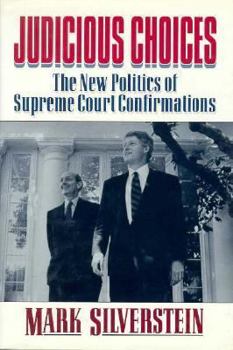Judicious Choices: The New Politics of Supreme Court Confirmation
Select Format
Select Condition 
Book Overview
Since the defeat of Abe Fortas in 1968, the process of selection and confirmation of nominees to the Supreme Court has shifted from tightly controlled, leadership-dominated deference to presidential... This description may be from another edition of this product.
Format:Hardcover
Language:English
ISBN:0393036928
ISBN13:9780393036923
Release Date:January 1994
Publisher:W. W. Norton & Company
Length:188 Pages
Weight:0.85 lbs.
Dimensions:0.8" x 5.8" x 8.5"
Customer Reviews
1 rating
Still relevant material after ten years of publication
Published by Thriftbooks.com User , 18 years ago
I began to read this book at the beginning of the Alito nomination. The book notes Pres. Clinton's Supreme Court appointments, but the focus is on how the nomination process has changed over the years to become so partisan and polarizing. The author's thesis is that the partisanship over nominations came when Strom Thurmond ambushed Abe Fortas in 1968 and prevented his elevation to Chief Judge. This was the first defeated (Fortas's name was withdrawn) nomination since 1930. The story becomes more interesting as the author provides historical analysis of changes in judicial restraints in overturning legislation. This attitude ended with the Warren (followed by the Burger) Court, but as the author notes, the shift may have in part been due to the reluctance of legislatures to address pressing social concerns. The book offered many insights on the workings of the executive and judicial branches that I had not considered. It was less enlightening when writing about Congress. The theme of judicial restraint was particularly useful and relevant to today's Court. Take for example the conservative's furor over the Court's support for state legislation on eminent domain and assisted suicide laws. These were good examples of the justices using judicial restraint and following state rights for deciding on their own legislation, exactly what conservatives say the courts should allow. But, since the decisions did not fall on the side of how conservatives wanted the cases to be decided; the conservative argue that the justices should have taken the choice out of the state's hands. If the Court had done that, it would have been a perfect example of judicial activism as was done in the Warren/Burger Courts. It is interesting to see how the arguments for and against judicial restraint/activism can be so convoluted and hypocritical. Both liberals and conservatives suffer in this analysis as victims of the chickens coming home to roost. The book also shows how neither political party is that anxious to have the courts exercise real restraint and thus forcing the politicians to make unpopular decisions.






